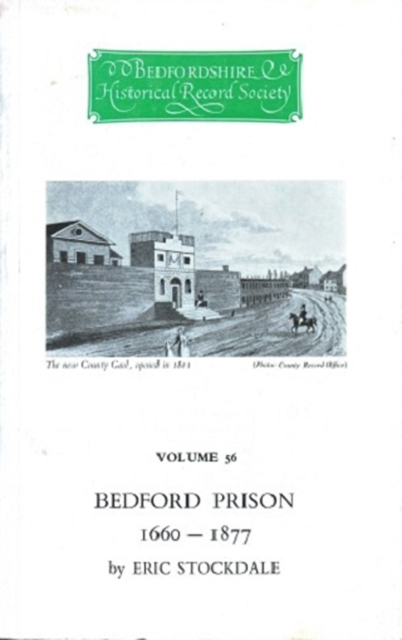Book contents
- Frontmatter
- Contents
- Acknowledgments
- Foreword
- Introduction
- Chapter 1 John Bunyan 1660-1688
- Chapter 2 Some Contemporaries of Bunyan
- Chapter 3 The Richardson-Howard Family of Jailers 1711-1814
- Chapter 4 Transportation to America Before 1776
- Chapter 5 John Howard 1773-1790
- Chapter 6 Samuel Whitbread 1790-1815
- Chapter 7 Philip Hunt 1815-1835
- Chapter 8 Philip Hunt 1815-1835
- Chapter 9 Lord John Russell In Office 1835-1841
- Chapter 10 The Rebuilding of The Jail 1839-1849
- Chapter 11 The Unsettled Years 1849-1853
- Chapter 12 The Final Years Before Nationalisation 1853-1877
- Conclusion
- Note On References and Spelling
- Appendix 1 Bedford in 1765
- Appendix 2 Jailers of Bedford 1710-1885
- Appendix 3 The Richardson-Howard Family
- Appendix 4 Site Plan of Bunyan’s Jail
- Appendix 5 Deed of Appointment of Jailers 1740
- Appendix 6 The Whitbread-Howard Link
- Appendix 7 Lord John Russell’s Family
- Appendix 8 Bedford in 1841
- Appendix 9 The Jail in 1849
- Index of Names
- Subject Index
- Bedfordshire Historical Record Society
- Miscellaneous Endmatter
Chapter 10 - The Rebuilding of The Jail 1839-1849
Published online by Cambridge University Press: 03 August 2023
- Frontmatter
- Contents
- Acknowledgments
- Foreword
- Introduction
- Chapter 1 John Bunyan 1660-1688
- Chapter 2 Some Contemporaries of Bunyan
- Chapter 3 The Richardson-Howard Family of Jailers 1711-1814
- Chapter 4 Transportation to America Before 1776
- Chapter 5 John Howard 1773-1790
- Chapter 6 Samuel Whitbread 1790-1815
- Chapter 7 Philip Hunt 1815-1835
- Chapter 8 Philip Hunt 1815-1835
- Chapter 9 Lord John Russell In Office 1835-1841
- Chapter 10 The Rebuilding of The Jail 1839-1849
- Chapter 11 The Unsettled Years 1849-1853
- Chapter 12 The Final Years Before Nationalisation 1853-1877
- Conclusion
- Note On References and Spelling
- Appendix 1 Bedford in 1765
- Appendix 2 Jailers of Bedford 1710-1885
- Appendix 3 The Richardson-Howard Family
- Appendix 4 Site Plan of Bunyan’s Jail
- Appendix 5 Deed of Appointment of Jailers 1740
- Appendix 6 The Whitbread-Howard Link
- Appendix 7 Lord John Russell’s Family
- Appendix 8 Bedford in 1841
- Appendix 9 The Jail in 1849
- Index of Names
- Subject Index
- Bedfordshire Historical Record Society
- Miscellaneous Endmatter
Summary
Rebuilding Considered
The visiting justices, of whom T. C. Higgins was one, were certainly aware of the shortcomings of the existing prison buildings in April 1839 when they complained: ‘The construction of the prison is not calculated for long imprisonments; the discipline also, though suitable for short terms of imprisonment, is too severe for those who are committed for long periods; and it is a matter of regret that there are instances from the last assize of commitments of two or even three years. It is utterly impossible that the human frame can endure that confinement, and transportation for a limited period seems to be much less likely to be injurious to such individuals’.
A few weeks later the justices assembled at quarter sessions took note of the new Prisons Act and of a letter of Whitworth Russell, ‘who seemed to be of opinion that several considerable alterations would be necessary’. The minutes continue: ‘It having been signified that it might be advisable to consult with Captain Gepp (sic) who had given considerable attention to the subject, resolved: That the Chairman be requested to write a letter to the Inspector signifying the wish of this court that Mr. Giles as the county surveyor should meet him and Captain Gepp to confer on the subject and on the alterations which may be considered necessary and proper, and also to instruct Mr. Giles to effect such meeting and make his report at the next quarter sessions’.
Joshua Jebb was at this stage quite unknown in the county so that the mis-spelling of his name is not strange. Whitworth Russell and his fellow Inspectors on the other hand had by this time got to know him quite well as they had collaborated with him, somewhat uneasily, for exactly two years. Jebb resented the Inspectors’ interest in plans, and they in turn became increasingly annoyed by his arrogant assumption that questions of construction were for him, the engineer, alone. The first signs of prickliness appear in a letter from an Inspector to Jebb, dated 19 September 1839: ‘I feel very anxious that it should be clearly understood at the Home Office that you concur in our application to be associated with you in the revision of plans submitted to the Secretary of State for his sanction.
- Type
- Chapter
- Information
- Bedford Prison 1660-1877 , pp. 161 - 180Publisher: Boydell & BrewerFirst published in: 2023



